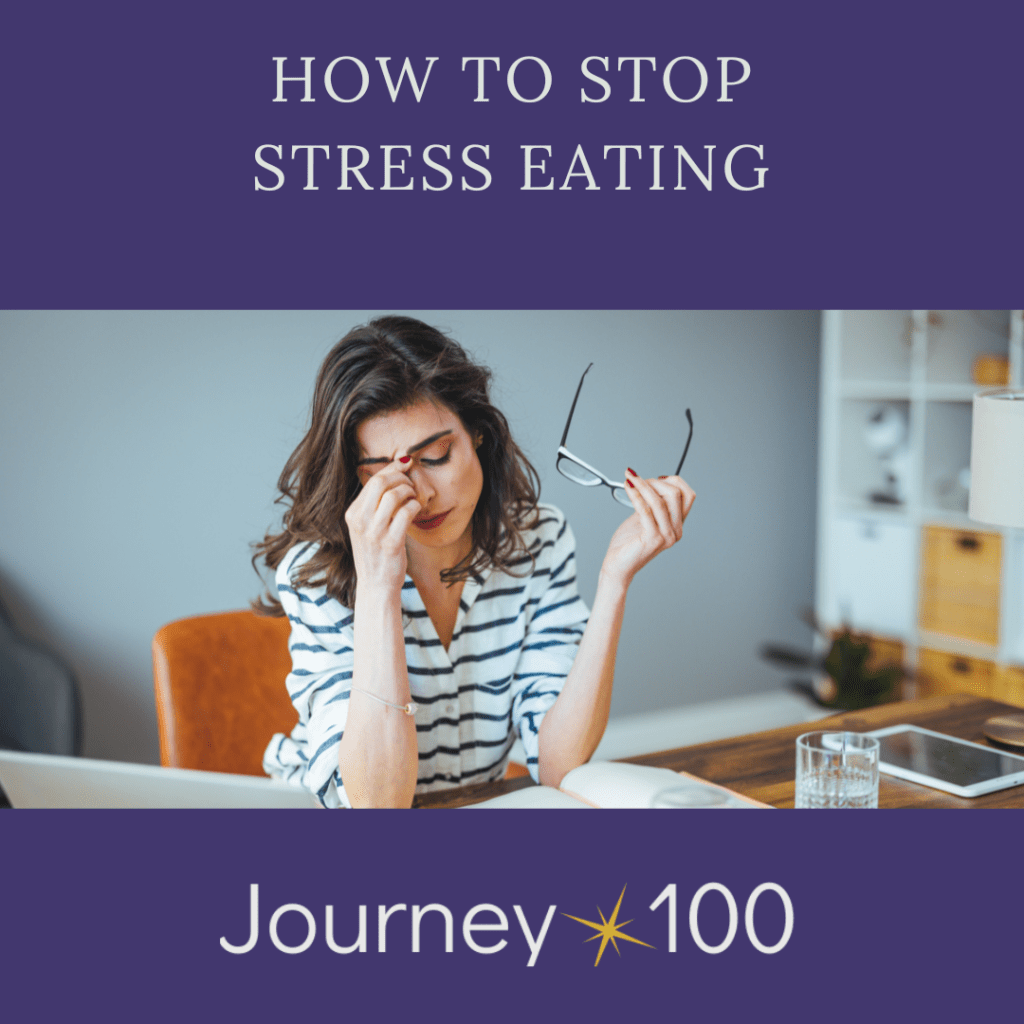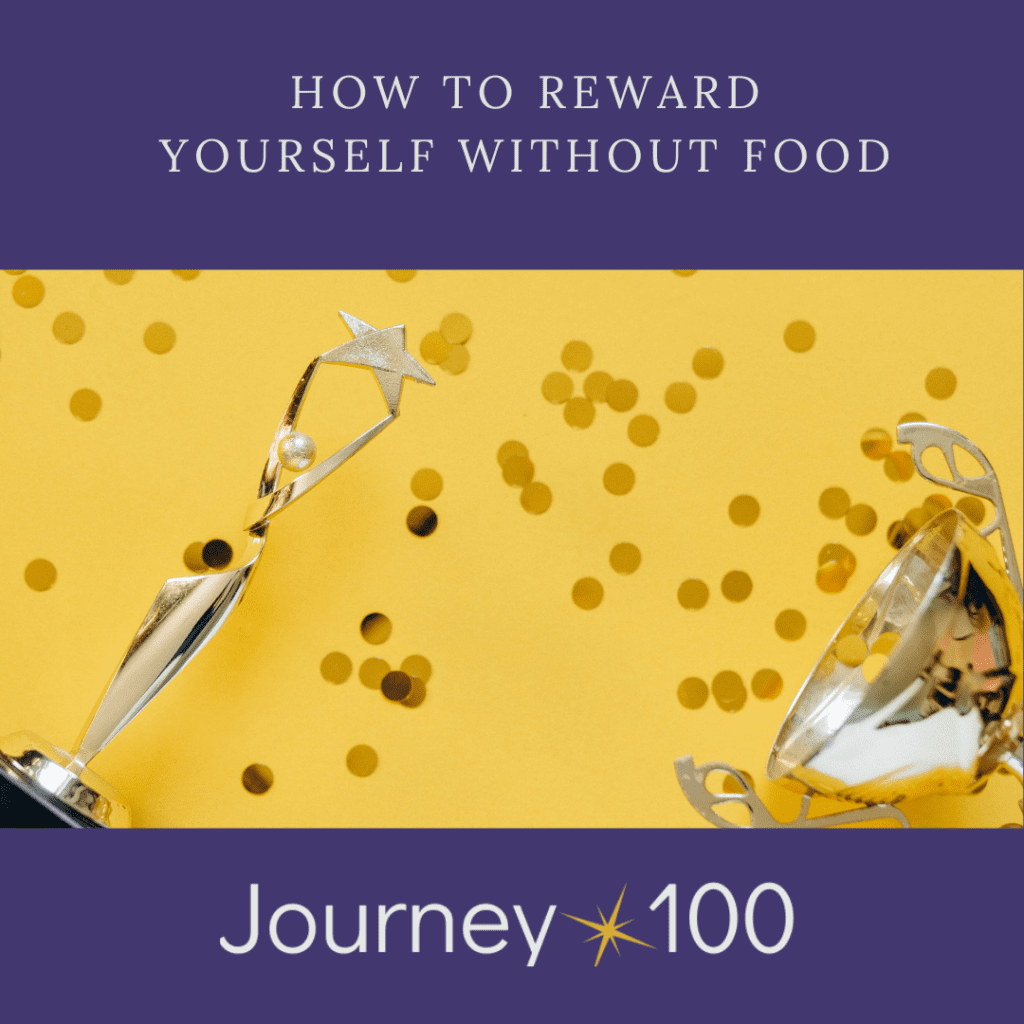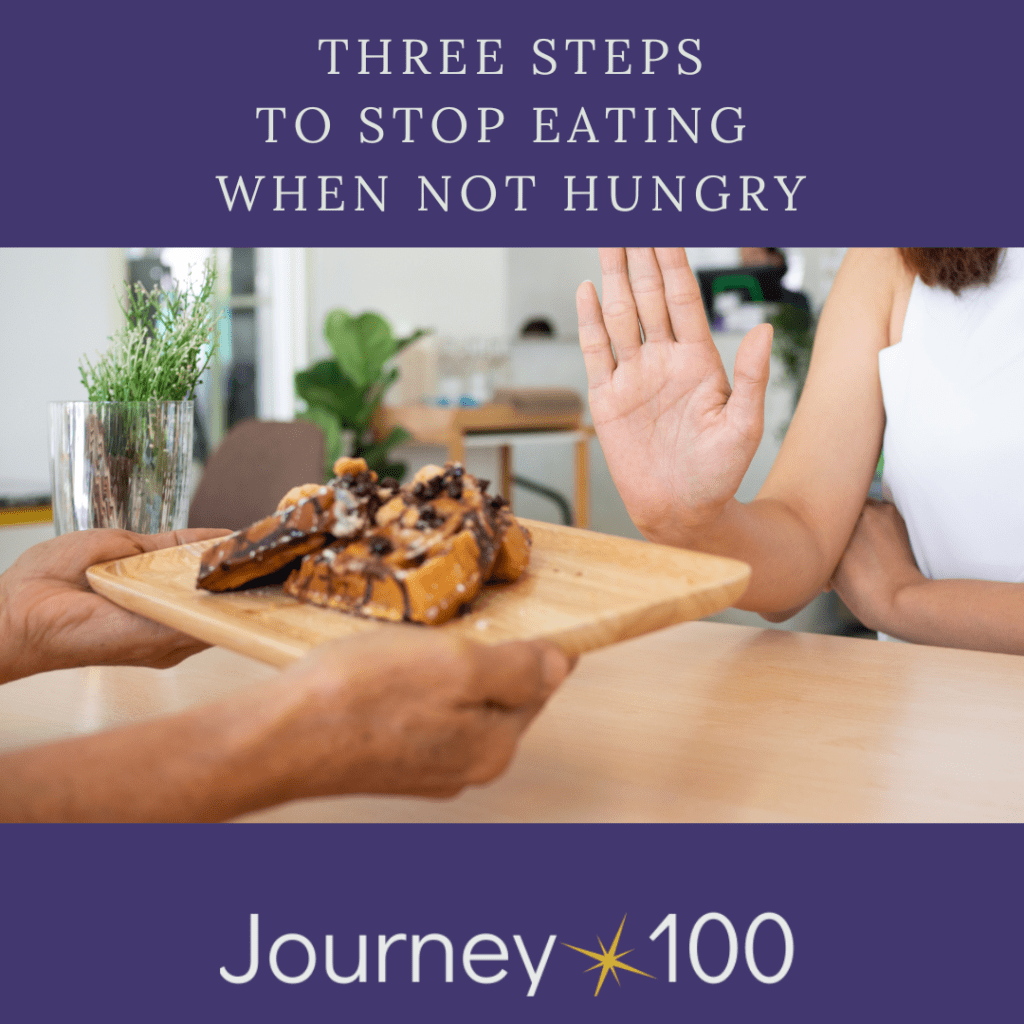How to Stop Stress Eating

Feeling Stressed? You’re Not Alone When life feels overwhelming, it’s easy to turn to food for comfort. Stress, anxiety, exhaustion—it can all lead to mindless snacking or emotional eating. If you find yourself reaching for food when you’re not truly hungry, you are not alone. And more importantly, you deserve other ways to care for yourself that actually help you feel better. Food might feel like the easiest way to soothe stress, but it’s temporary. Real comfort comes from addressing what you truly need. Here are three simple ways to stop stress eating: 1. Start with Gratitude When stress hits, it’s easy to focus on what’s wrong. A simple shift toward gratitude can help break the cycle of emotional eating. Try this quick practice: Take a deep breath. Name three things you’re grateful for—big or small. Let that gratitude fill your mind and body for a moment. Gratitude helps ground you in the present, making it easier to respond to stress in a way that actually feels good. 2. Take a 10-Minute Break from the Urge to Snack Cravings often come in waves and pass if you give them time. Instead of immediately reaching for food, take a short break and do something else for 10 minutes: Step outside for fresh air. Listen to a song that lifts your mood. Do a short breathing exercise. Often, by the time the 10 minutes are up, the urge to snack has passed, and you’ll feel more in control of your choices. 3. Move Your Body to Release Stress When emotions build up, movement is a powerful way to release them—without food. Try: Stretching for a few minutes. Shaking out your arms and legs to let go of tension. Dancing to your favorite song. Movement doesn’t have to be a workout. It’s just about reminding yourself that your body is strong and capable, and that you can handle stress in a way that supports you. You Deserve True Comfort Eating to soothe stress is understandable, but it doesn’t solve the problem. In fact, when you choose to stress eat, it temporarily distracts you from the stress but adds more later as you feel overly full or gain weight. You deserve real comfort—comfort that lasts beyond the moment. By trying these small, simple shifts, you can begin to create new ways to care for yourself without relying on food to relieve your stress. The next time stress hits, pause. Breathe. Choose something that truly helps you feel better. You are stronger than you think. Need More Support? If you’re looking for more ways to manage stress, take care of yourself, and lose weight in a way that feels good, I’m here to help. Let’s do this together. Click here to schedule a call with me. Your Coach, Andrea
How to reward yourself without food

At my highest weight of 250 pounds, rewarding myself with food was an everyday event. Got through a tough meeting? Head to Starbucks for a tasty drink. Kids behaving badly and you aren’t screaming at them? Sneak a few Oreos from the pantry. Slayed your To-do list like a boss? Toast yourself with a glass of wine. It’s so important to learn how to reward yourself with non-food items as rewarding yourself with food works against weight loss. Below, we’re diving into how to reward yourself without food to make your weight loss journey not just successful but also enjoyable. Here are some non-food rewards to treat yourself as you crush your goals: Free Rewards: Take a relaxing bubble bath. Watch a favorite movie or TV show. Read a book in a quiet corner. Meditate for 15 minutes. Practice yoga or stretching exercises. Go for a nature walk. Sunbathe in a park. Listen to your favorite music or podcast. Do a DIY spa day at home. Write a Thank You letter to yourself. Under $20: Buy a new journal or planner. Get inspirational stickers for your water bottles. Purchase a scented candle or essential oils. Treat yourself to a new workout shirt. Buy a new book or e-book. Get a massage ball or foam roller for self-massage. Try a new skincare or beauty product. Invest in a quality water bottle. Buy fresh flowers for your home. Get a new houseplant. Under $50: Book a manicure or pedicure appointment. Treat yourself to a massage. Buy a subscription to a meditation or mindfulness app. Buy a new workout outfit. Purchase a quality yoga mat. Try a new outdoor activity – stand up paddle boarding, kayaking, pickleball, etc. Try a virtual cooking class. Buy yourself a charm bracelet to add charms for every 10 pounds lost. Buy a new piece of clothing you’ve been eyeing. Buy a smart scale. Over $100: Book a professional photoshoot – especially great when you reach your goal weight! Treat yourself to a weekend getaway. Join a boutique fitness center. Get a personalized nutrition consultation. Treat yourself to a luxury skincare set. Book a session with a personal trainer. Purchase a new fitness gadget – Garmin, Fitbit, Apple watch, etc. Buy tickets to a live event or concert. Get a set of adjustable weights. Splurge on a new wardrobe! Remember, learning to reward yourself without food not only will help you lose (and keep off!) more weight but it helps the process feel more enjoyable. As a human being we seek pleasure. By making your weight loss journey more pleasurable, you are more likely to stick to the process, get to your goal weight and enjoy it! Which non-food reward will you try? Your Coach, Andrea
Three steps to stop eating when not hungry

Eating when you are not hungry equals weight gain. And if you are on a weight loss journey that is a recipe for disaster! But how do you stop eating when you aren’t hungry? Follow these three steps to get back in tune with your body and stop eating when you aren’t hungry: Step One: Identify your hunger signs The first step to stop eating when you are not hungry is to figure out if you really are hungry. For many women this can actually be quite difficult. You’ve spent years eating by the clock, eating to relieve stress or eating because it simply feels good. To determine if you are physically hungry, drop into your body. What does that look like? Close your eyes. Ask yourself where do I feel hungry? For me, I know I am truly hungry when the middle of my abdomen feels a little tight. I also get slight growls in my stomach. If I have been truly hungry for a bit then the hunger starts appearing in the front of my head as a slight headache and I will feel my energy levels begin to dip. On the other hand, these physical sensations are not present when I am not hungry. Instead I will find myself “tasting” food in my mouth, like daydreaming about how good a Reese’s peanut butter cup would be right now. Sometimes when I am not hungry but WANT to eat, I will ask myself “Am I hungry?” and then soon enough I will feel a little tingle in my stomach. This is phantom hunger. It’s like a little ghost of hunger that comes pretty quickly after I get a craving for something. This isn’t true hunger. How do I know? Go to step two. Step Two: Take an inventory of your circumstance When I find myself wanting to eat when I’m not physically hungry, I take a moment to figure out what is going on in my life. One great way to do this is ask yourself “If I wasn’t going to eat right now, what would I be doing?” So often that 3pm hunger is actually being tired of work and not wanting to start another work task. In the evenings, I would be left alone with my thoughts about what I screwed up during the day, what’s left to be done tomorrow or thoughts of how I’m so exhausted and nothing really feels good in my life. Other times, I am just plain bored and want to be entertained! Once you figure out if you want to eat to avoid something in your life, then solve for that. If I am tired of work and don’t want to start another work task, then I take a 15-minute break and go for a walk, meditate or watch a couple silly tiktok videos (be sure to set a timer and don’t go beyond the 15 minutes!). If I’ve put the kids to bed and I don’t want to be left alone with my troubling thoughts, I break out my journal, jot down a quick to-do list for the next day, tell myself I’m a good wife and mother, then give myself permission to rest and relax. If I want to be entertained, then I snuggle in a blanket and watch my favorite show. Understanding what you truly need in that moment will help you understand and care for yourself better. When you start solving for what is actually bothering you, the less you will feel driven to eat at times when you are not hungry. If you’ve identified the non-food reason you want to eat when you aren’t hungry but still feel compelled to eat, continue to step three. Step Three: Do a hard reset Our brains present persistent thoughts of wanting to eat when we are not hungry simply because it is trying to avoid something in our life (see step two) AND there is not much else for it to do. On my weight loss journey, I found that continuing to push through and simply NOT eat was difficult. This was especially the case when I started working from home during COVID. I worked in the living room and thoughts about what was in the fridge started popping into my head. I’d ask myself “What would I be doing if I wasn’t eating” and the answer would generally be doing a work task. So I would acknowledge I didn’t want to do the work task, take a little break and then start the task anyway. But the thoughts kept coming. In those instances, I gave myself a protocol to help me reset. I would chug a giant glass of water, get outdoors for a five-minute walk and talk to myself. The magic in the reset is creating different sensations for yourself. The glass of water will help your body feel different on the inside (fuller and maybe colder). Getting outdoors will help you feel different on the outside (sun on your skin, wind on your face, maybe it’s warmer or cooler than your home). Finally talking to yourself. Be very specific in the things you say. This is a time to speak to yourself kindly and cheer yourself on. I often say “I’m so proud that I took this time to reset. I’m so glad that I am choosing my bigger goal over something I want in this moment. This is what self care looks like and I’m so happy I made this choice.” Final reminder: Even if you eat when you are not hungry, remember that it will never help to be unkind or berate yourself. Your weight loss journey will never be a straight line to your goal weight. Be open to learning when things don’t go as expected. If you are learning then you are always moving forward with better knowledge for the future. If you struggle with eating when you are not hungry, I can help. Schedule
How To Stop Night Time Snacking

How do you stop late night snacking?! It’s a problem that many of my clients have. You finish up the nightly chores, put the kids to bed and grab a seat on the couch to relax for a bit. Then it hits you, “I think we still have some of those chips in the pantry” or “I could really use some chocolate right now.” Whatever the craving, it comes down to eating when you hadn’t intended and with a side effect of weight gain that you truly didn’t want. Here are five tips to STOP night time snacking: Make a commitment Sounds simple enough but this is different than simply saying that you want to stop night time snacking. This is an actual commitment that you follow through on. Something I do with myself and coach my clients on is the concept “Decide and done.” Once you make the decision that you are not going to snack at night anymore, that’s it. No more discussion. No more back and forth with excuses and justifications. No more second guessing the decision. Going back and forth with yourself about whether or not to have that snack only serves to make you miserable now and potentially make a decision that takes you further away from the person you are trying to become. “To-try list” The thoughts we think are instructions for our brain. When we tell our brain NOT to do something, the instructions aren’t very clear. While the instruction to not do something is generally singular, the options for what to do can be endless. With lack of clarity on what to do in that moment, your brain will want to default back to what it knows and what it has always done: reach for the night time snacks. To make the instructions for your brain more clear, make a list of 20 things to try when you are having a craving to snack at night. Every person is different so I can’t tell you that knitting will certainly work any more than I could tell you the reading a book would. These are things to try and then evaluate how well they worked. Change your routine Humans are creatures of habit. We love routines and predictability. If night time snacking is a part of your routine, then consider creating a new night time routine. You don’t have to turn the whole routine upside down. It could be something as simple as not sitting in your usual spot on the couch. Also, be aware that if your body is used to being fed again at 9pm you are likely going to experience hunger cues at that time for a few weeks before your body gets used to the new routine. This is OK. Expect it and remind yourself that you are getting closer to being the future version of you that doesn’t snack at night. It’s something to be celebrated! Close down your mouth After dinner, clean your mouth and shut it down for the night. Take the time to brush and floss your teeth, rinse with some mouthwash as well as put some Chapstick on. I don’t know about you but I LOVE a fresh and clean mouth. When I have that clean minty feeling, I have no desire to eat plus the taste from the toothpaste also alters the way food tastes (hello orange juice!). Not only can this deter you from wanting to eat but it also a great self care. Self Care A lot of my night time snacking had nothing to do with being hungry. Many nights I would plop down on the couch after a long, stressful day and want to eat something just to feel good. Especially during the pandemic, many of us are just wanting to feel good instead of the stress we feel daily trying to juggle working from home with homeschooling and keeping every one healthy and safe! The simplest version of self care is to check in with yourself before you make the decision to eat. Ask yourself “What am I really hungry for?” or “If I wasn’t hungry, I would be feeling…” Allow yourself to get curious with what else might be going on. Are you lonely or bored? Did today feel pretty crappy and you just want to feel good? Are you tired and just need to go to bed? The best form of self care is to give yourself the support you truly need. So those are my five tips to stop night time snacking but I will give you a bonus tip as well. Maybe you feel like this is all too overwhelming and beyond what you can handle right now. That’s OK. We all have different abilities at different times in our lives. Maybe for you the best thing is to just not buy the types of foods you snack on late at night and replace them with more nutrient dense, prepackage snacks. It is best to have them prepackaged and commit to only having one a night. As you master that level up in your nighttime snacking game, you will feel more confident in eventually cutting it out entirely.
